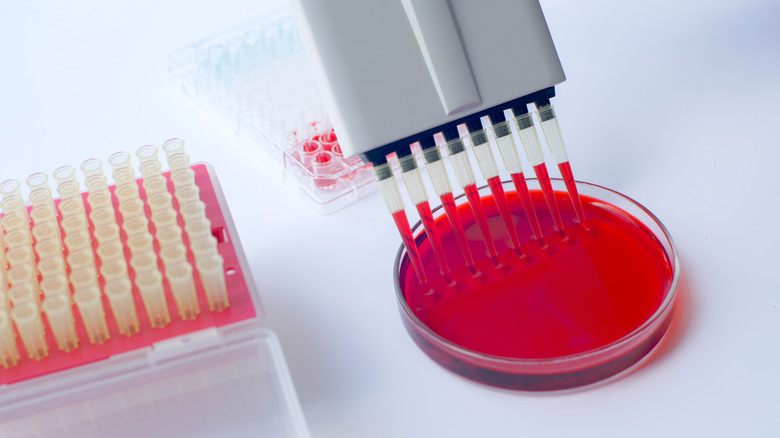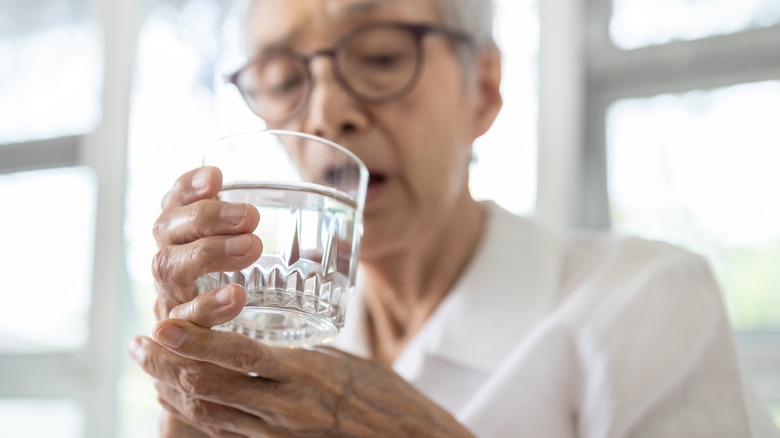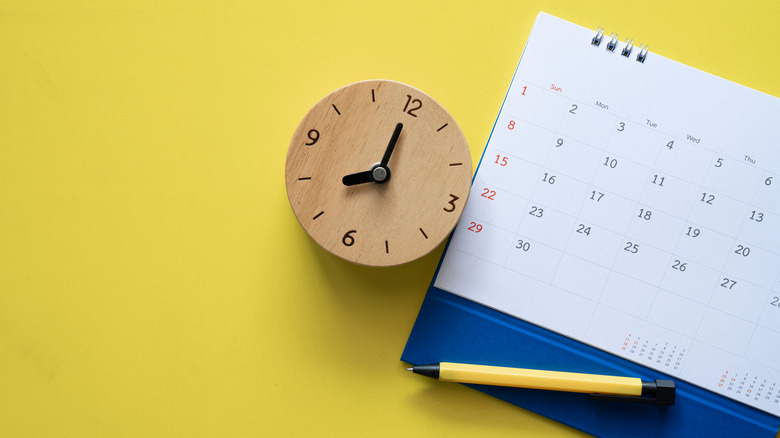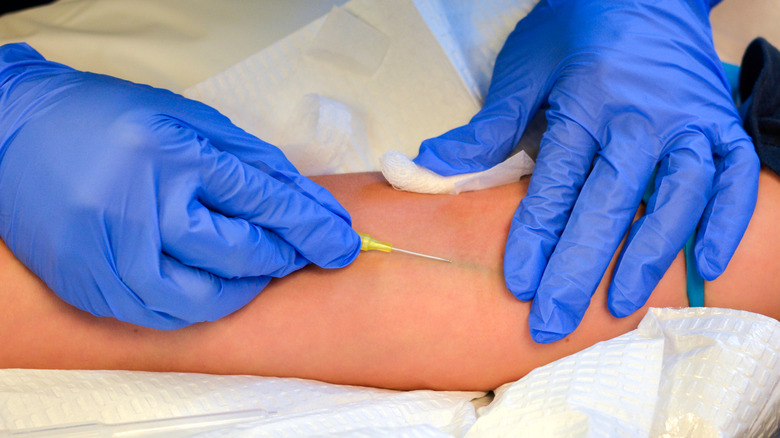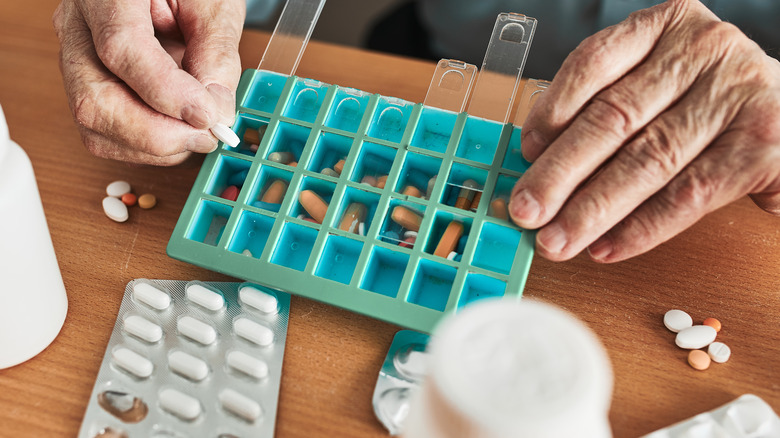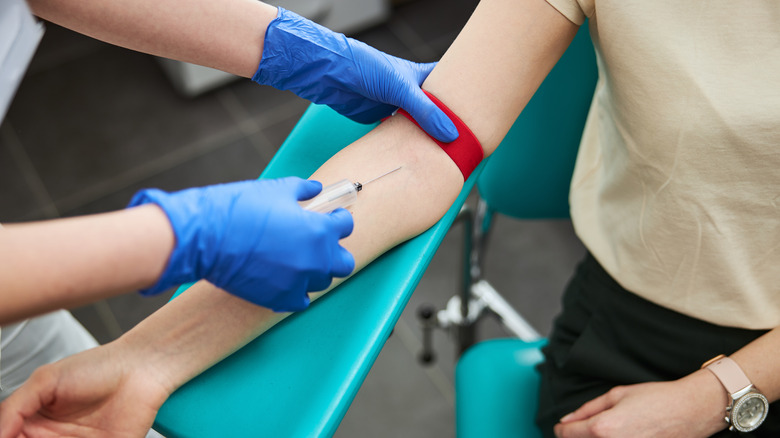Everything You Should Know Before Getting A Blood Test
Your blood is quite impressive. It can tell you if it's clotting like it should be, if you have potential infections or conditions, and whether your organs are working correctly. So, don't be surprised if your doctor orders bloodwork as part of your annual or bi-annual checkup. Often, blood tests offer an easy, straightforward way for your doc to see how your body is functioning as a whole and determine if there is anything they should monitor more closely (via the National Heart, Lung, and Blood Institute).
Some people may need bloodwork more regularly than others to monitor specific conditions, but most adults could benefit from routine bloodwork, Dynacare specialist Dr. Doug Tkachuk tells Global News. "I would advise patients to discuss if they should be having any blood work done for themselves if they have recently switched doctors or have not had a check-up for several years," says Tkachuk.
So, we know that blood tests can be a crucial part of your health profile. But if you're new to getting blood draws, there are several essential things to know before you go to your appointment.
The whats and whys
When your doctor mentions bloodwork, they might rattle off a bunch of tests they'd like to order for you without explaining what any of them are. As the patient, you have every right to know what blood tests you'll be getting and what they look for. Plus, according to the Duke Center for Personalized Health Care, your medical care should be a collaborative process where you get just as much of a role in decision-making as your provider does.
Therefore, get comfortable with asking questions, such as: "Can you name the tests again so I can write them down?" or "Why is this test important for me?" MindBodyGreen names complete blood count (CBC), comprehensive metabolic panel (CMP), hemoglobin A1C, and a lipid panel as common tests for routine doctor's visits. However, that doesn't necessarily mean you, specifically, need them all at every visit. If you're paying out of pocket, unnecessary tests can become unaffordable. Your doc can sometimes find alternatives or split the tests over a few months to help you budget.
Get your doctor's orders
Laboratories require orders for a patient before completing bloodwork. These orders ensure that the lab completes the correct tests and ties them to the right patient. While some labs do allow patients to order their own lab tests for personal monitoring and information, any labs your doctor wants you to have must go through the doctor themselves. Also, many labs require the doctor's signature, along why the tests are medically necessary (via Texas Medical Association).
The Texas Medical Association notes that phone, fax, and email are common delivery methods for doctor's orders. Some physicians hand-print orders to the patient to bring into the lab for their appointment. However, more practices are using electronic methods for lab orders, which allow them to send the orders straight to the lab. According to Practice Fusion, electronic orders save doctors' offices about 50% of the time it would take them to complete paper orders, and they're more reliable and accurate than paper orders. If you tend to misplace paperwork easily, you might want to ask your doc if they can send your orders to the lab electronically.
Ask about eating and drinking
Some blood tests don't require anything but for you to show up with your doctor's orders in hand. Others have a few instructions to ensure that your results are as accurate as possible.
According to MedlinePlus, you'll need to fast for 8 to 12 hours before heading to your appointment. During a fast, the only acceptable thing to put in your body is water. Smoking, chewing gum, and even having that cup of morning coffee can skew results. Tests that usually require fasting include lipid tests, which measure fats in the bloodstream, and glucose tests that measure blood sugar levels. Eating and drinking anything other than water can make your levels higher than they'd be otherwise, and your doctor wants to know what your numbers look like without the influence of food and drinks.
Other tests may require you to avoid certain foods, but not all foods, according to Main Line Health. For instance, eggplant, tomatoes, and bananas can affect the results of a 5-Hydroxyindoleacetic Acid (5-HIAA) test, and caffeine and alcohol might negatively affect a metanephrines test.
Open up your morning schedule
Do you have a few minutes to spare at the start of your day? Some blood tests are best scheduled in the morning, especially if you've been fasting. MedlinePlus states that morning blood work is usually best for the patient because fasting can be simpler overnight while you're sleeping. Go in, get your bloodwork, and have your breakfast when you're done to calm your rumbling tummy.
But, convenience isn't the only reason to schedule blood tests in the morning. For instance, the Cleveland Clinic notes that your blood sugar, which is detected by a fasting blood sugar test, is usually at its lowest in the morning because you've likely refrained from eating and drinking anything overnight. SynappseHealth adds that other tests may be more accurate when they're completed in the morning because of the way certain bodily substances move and function throughout the day. Some tests that are usually more accurate in the morning include iron, potassium, phosphorus, and cortisol labs.
Keep yourself hydrated
Hydration is key to a successful blood draw, according to Phlebotomy Training Specialists. Not only will staying hydrated in the days leading up to your appointment make you feel better during and after your test, but it will also help your veins be more visible. That means that you won't need to get poked as much to get a decent vein. Dehydration can also lower your blood pressure, making it more difficult to draw blood and raising your risk of fainting or feeling ill after your test.
Not drinking enough water can also affect the accuracy of your results on some blood tests. According to My One Medical Source, tests for cholesterol, kidney values, electrolytes, and complete blood count may all be less precise when you don't have enough water flowing through your system.
Not sure if you're dehydrated? Look for common signs of dehydration, like fatigue, dizziness, extreme thirst, and dark-colored urine (per the Mayo Clinic).
Stay nourished
The most important question to ask your doctor before getting a blood test is whether you're allowed to eat before your test or should fast for several hours or overnight. However, if you're allowed to eat, be sure to make the most of your meals.
According to Nuffield Health, a drop in blood sugar rasises the risk of fainting or feeling faint. You might even already feel faint if you're anxious about getting your blood drawn (via the Cleveland Clinic), so you'll want to do what you can to avoid that feeling and stay calm. Nuffield Health suggests setting up a morning appointment if you need to fast (as mentioned earlier in the article) so that you don't need to go too long without eating, and making sure you don't skip meals if you don't have to fast.
A good rule of thumb is to stay nourished like you would if you were donating blood, especially if the lab needs to take several blood vials for different tests. According to Healthline, eating foods rich in iron, like beef, chicken, tuna, and eggs, can help your body increase its iron levels to avoid drops after drawing blood.
Prepare financially
Some blood tests are just a few dollars, while others can range into the hundreds. Preparing for the cost of your tests is an important part of the process, but one you might not think about until you get a bill in your hands.
If you're a self-pay patient, consider talking to your doctor about any blood tests before you get them. It might be possible to order other tests or postpone a few to help you budget. Walk-In Lab also suggests comparing the costs of your tests at different labs, as they may price your tests differently. Consult with your doctor to electronically deliver your orders to the lab that's more affordable for you. You might also look for community health centers in your area that provide free or low-cost healthcare to eligible individuals (per The C.W. Williams Community Health Center, Inc.).
If you have insurance, call your insurance company or look over your paperwork to estimate your costs. Many insurances cover routine bloodwork, but more uncommon tests may not be covered or could result in high copays or deductibles (via Walk-In Lab).
Exercise is not recommended before your blood test
Your doctor may tell you to stop some activities before heading to your blood test, depending on the type of tests ordered. Of course, not eating for a few hours is one of the most common things you'll hear. With that usually comes refraining from smoking and drinking, which by now you know can also skew fasting blood tests (per Healthline).
But some activities that wouldn't normally be considered problematic might also be off-limits, like exercising. According to Nuffield Health, physical activity speeds up your metabolism and digestion. Therefore, exercising too close to your blood test appointment could affect the accuracy of test results that monitor digestive processes.
Some tests, like the prostate-specific antigen (PSA) test that measures a prostate protein, even require patients to avoid having sex or releasing sperm within 48 hours of their test for best results (per NHS).
In summary, it's always best to check with your doctor on any specific activities you should postpone until after your test, just in case.
Warm up those veins
The last thing you probably want during a blood test is hard-to-find veins. Still, it happens to the best of us, and it might be because your veins are chilly. And if you're cold, there's a good chance that your veins are a bit chilled, too.
Nurse Caroline Cartledge tells SELF that wearing warm clothes to your appointment can keep you warm and, therefore, your veins warm, which can prevent them from constricting as things often do when cold. If you forgot your sweater, using a heat pack for a few minutes could also do the trick; the lab might even have a few available, so don't be afraid to ask.
Phlebotomy U also instructs future and current phlebotomists to exercise a patient's arm for a few minutes if they're having trouble locating a vein. Jumping jacks or bicep curls can get the blood moving just enough to make the vein easier to locate.
Consider your medications
Some patients may need a blood test specifically to check whether the medications they're taking are doing what they're supposed to. This is known as therapeutic drug monitoring, and it's usually ordered to check for specific medications, like autoimmune condition drugs and antibiotics (via MedlinePlus).
While you'll need to continue taking your medications to get accurate results for these tests, you may need to stop taking some or all of your regular prescriptions for other tests. The only way to know for sure is to check with your doctor. Be sure to give them your full rundown of medications and vitamins, just to make sure that everything you take is included in your file. According to Lab Me, some medications can interfere with results, including prescriptions that affect thyroid hormone and cholesterol levels. In most cases, simply postponing a dose until after a test could do the trick, but in other cases, your doc may want you to stop taking a medication for longer.
Find ways to relax
It's not uncommon to feel anxious before getting bloodwork, clinical psychologist Michele Bedard-Gilligan tells UW Medicine. "We are preprogrammed to see something that pierces our skin as threatening," says Bedard-Gilligan. However, it is important to find ways to calm yourself down. "Sometimes this response is helpful, but it depends on the context. With a shot or a blood test, this fear is happening in the wrong place," Bedard-Gilligan explains, adding that a blood draw doesn't cause harm to your body, so there's no need for the alert.
Staying calm can keep your body relaxed during your blood draw, making the whole process feel less daunting. According to Bedard-Gilligan, staying hydrated and nourished before your appointment — up until the time you're allowed for a fasting test, of course — is one way to keep yourself feeling good. Other suggestions to keep your mind off the test and stay relaxed include talking to yourself and being mindful of your breathing throughout the process.
Let the lab know if you're needle-shy
Some patients get more than just a little anxious at the thought of having blood drawn; those with an actual fear of procedures involving needles may have trypanophobia. The condition is usually characterized as a severe fear of injections and needles that could make routine medical procedures challenging. While more than half of people with the fear contribute it to a previous negative experience, as many as 17% aren't sure what triggered their anxiety with needles (via Pharmacy Times).
If you are afraid of needles, one thing is for sure: You'll want to let the lab know before they start taking your blood. According to U.S. News, labs and their technicians usually have a few tricks up their sleeves to help frightened patients feel more comfortable, including using handheld devices that make it easier for them to find veins and prevent multiple pokes. Other modern devices can also reduce the pain involved with needle sticks simply through the use of vibrations and cold therapy. Checking with a lab about its available solutions could be a helpful way to determine where to have the doctor send your orders.
Learn how to check your results
Depending on the lab and types of tests you had, your results may come back quickly. If you're signed up for an online portal that delivers your results to your account electronically, you might even be able to see them the same day.
According to The Washington Post, between 15% and 30% of patients use a portal that allows them to view their results before their doctor explains them. While having access to your results quickly can sometimes put your mind at ease, it can also make you worry more. Although convenient, receiving results through a portal sometimes leaves patients unprepared for what they find. So, it may be better to wait until your doctor can call you to explain everything and answer your questions.
If you do want to peek at your results, try to understand what it all means. For instance, knowing the difference between grams per deciliter (g/dL) and international units per liter (IU/L) can help you read your results (via ADA). And, don't place too much weight on your results until you talk to your doctor, as false negatives and positives can happen (per MedlinePlus).
Understand what to do when it's over
After your blood test, the phlebotomist should give you basic instructions for caring for the draw site. Generally, you'll need to hold a piece of gauze in place over the site for a few seconds or minutes with gentle pressure to control bleeding. Elevating your arm slightly might be necessary if you continue to bleed (per Sonora Quest Laboratories).
Prepare to make another trip to your doctor's office or the lab after your results are in. Although another doctor's appointment isn't always necessary, it could be if your doctor finds anything concerning in your results. Your doctor may want to talk to you face-to-face for a diagnosis, monitor a condition, or talk to you about treatment options. However, don't be worried if your doctor still wants to chat about normal results. Some doctors choose to have you come in or talk over the phone simply to keep you up to date and explain any future steps for monitoring your health (via Verywell Health).

